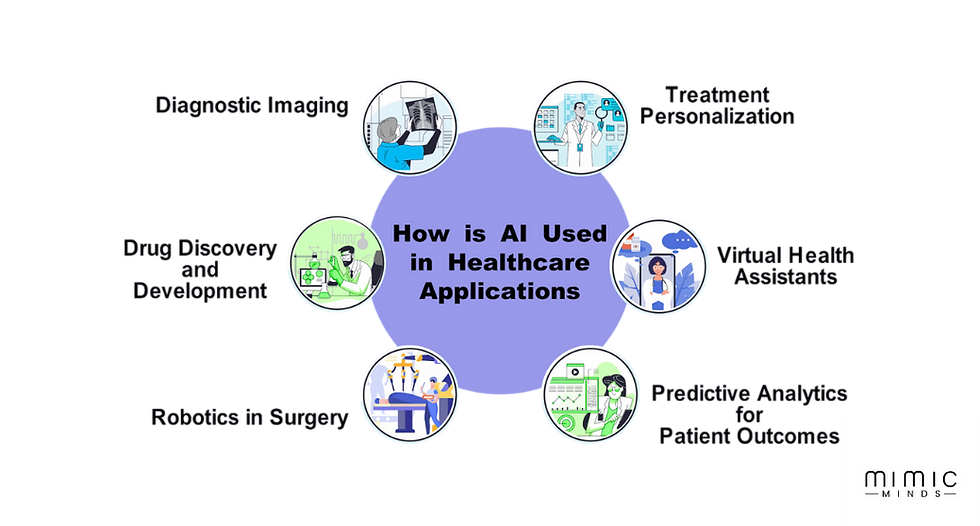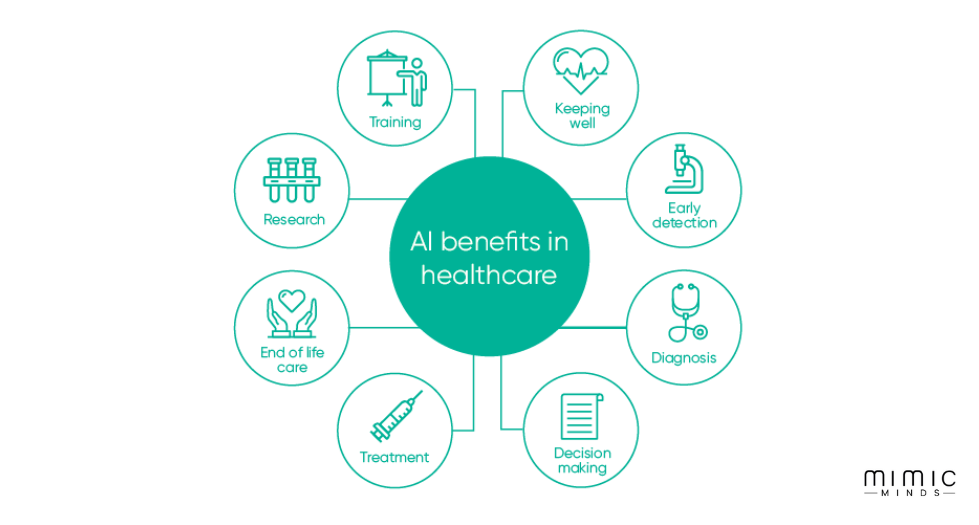AI in Healthcare: Applications, Benefits, and Future of AI in the Healthcare Industry
- Mimic Minds
- Sep 22, 2025
- 5 min read

The healthcare industry is undergoing a major transformation, driven by the rapid adoption of artificial intelligence. AI in healthcare is no longer a futuristic idea—it is already being used in hospitals, diagnostic centers, and research labs across the globe. From detecting diseases at earlier stages to predicting patient outcomes, AI is enabling faster, more accurate, and cost-effective medical solutions.
At its core, AI in healthcare uses advanced algorithms, machine learning, and generative AI models to analyze vast medical datasets, support doctors in decision-making, and improve patient care. Whether it’s automating routine administrative tasks, enhancing diagnostic imaging, or creating personalized treatment plans, AI is helping organizations streamline operations while focusing on better patient outcomes.
This article explores what AI in healthcare is, how it works, real-world applications, benefits, examples, and challenges. We’ll also look at how AI is shaping the future of healthcare and why it matters for patients, doctors, and healthcare providers. Table of Content:
What Is AI in Healthcare?
AI in healthcare refers to the use of artificial intelligence technologies—including machine learning, natural language processing, computer vision, and predictive analytics—to improve healthcare delivery. It covers everything from clinical decision-making to hospital management.
In simple terms, AI in healthcare acts as a digital assistant that analyzes massive medical datasets, provides real-time insights, and helps reduce human errors.
With AI in healthcare, organizations can:
Predict patient health risks and outcomes.
Automate diagnostic imaging and lab testing.
Improve patient satisfaction through conversational AI.
Reduce costs by automating administrative processes.
How AI in Healthcare Works

AI in healthcare works by combining data analytics, machine learning, and automation. It collects and processes health data—such as electronic health records, genetic profiles, and imaging scans—then uses algorithms to find patterns and make predictions.
Key components of AI in healthcare include:
AI Algorithms in Healthcare: Analyze medical scans, lab results, and clinical notes to detect conditions.
Predictive Analytics: Forecast patient readmissions, disease outbreaks, or treatment responses.
Conversational AI in Healthcare: Chatbots answer patient queries and support telemedicine.
Automation in Healthcare: AI handles tasks like claims processing, scheduling, and billing.
This combination ensures doctors have data-driven insights, reducing delays in treatment and improving accuracy.
Applications of AI in Healthcare

The applications of AI in healthcare are vast, and they span clinical, operational, and research areas. Below are some of the most impactful examples:
Medical Imaging & Diagnostics – AI detects tumors, fractures, and heart irregularities with higher accuracy than traditional methods.
Drug Discovery – Generative AI in healthcare accelerates drug development, reducing time and cost.
Patient Monitoring – Wearable devices powered by AI track vital signs and alert doctors in real time.
Personalized Medicine – AI tailors treatments based on genetics, lifestyle, and history.
Administrative Efficiency – AI reduces manual workload in scheduling, claims, and hospital resource management.
AI Chatbots in Healthcare – Virtual assistants provide 24/7 support to patients, answering FAQs and guiding them.
AI in Healthcare vs Traditional Healthcare: A Comparison
To understand the real impact, here’s a quick comparison:
Feature | Traditional Healthcare | AI in Healthcare |
Diagnostics | Manual, error-prone | Automated, accurate, predictive |
Speed of Results | Slow, paper-based | Instant, real-time insights |
Patient Engagement | Limited touchpoints | Continuous via AI chatbots |
Costs | Higher due to inefficiency | Lower through automation |
Workforce Support | Dependent on staff | Augmented by AI tools |
Benefits of AI in Healthcare

The benefits of AI in healthcare are seen across patients, doctors, and organizations. These include:
Improved Accuracy: AI reduces misdiagnosis and supports evidence-based treatment.
Faster Decisions: Real-time analytics lead to quicker interventions.
Cost Reduction: AI automates repetitive tasks, lowering hospital expenses.
Accessibility: Remote AI-powered tools bring healthcare to underserved areas.
Personalized Care: AI creates tailored treatment paths for patients.
Challenges and Ethical Considerations
Despite its promise, there are challenges and risks in using AI in healthcare.
Data Privacy Concerns: Patient records must be kept secure.
AI Bias in Healthcare: Algorithms can reflect bias if trained on incomplete data.
Implementation Costs: High for small hospitals and clinics.
Ethical Issues: Decisions must remain transparent and human-supervised.
These challenges highlight the need for responsible AI in healthcare—balancing automation with human oversight.
Future of AI in Healthcare

The future of AI in healthcare points toward even greater integration. By 2025, AI-powered healthcare systems are expected to handle a wide range of roles—from predictive disease modeling to robotic surgeries. Generative AI will create simulations for new drugs and personalize treatments at scale.
Emerging trends include:
AI Predictive Analytics in Healthcare: Early detection of chronic conditions.
AI Agents in Healthcare: Acting as virtual nurses and assistants.
AI in Healthcare Administration: Managing resources and reducing costs.
AI in Healthcare Market Growth: Increasing adoption by hospitals, insurers, and pharmaceutical companies.
The future of AI in healthcare is about creating proactive, preventive, and personalized healthcare systems that improve patient outcomes worldwide.
FAQs on AI in Healthcare
1. What is AI in healthcare?
AI in healthcare refers to using artificial intelligence technologies—like machine learning and predictive analytics—to improve medical decision-making, diagnostics, and patient care.
2. How is AI used in healthcare?
AI is used for medical imaging, drug discovery, patient monitoring, hospital management, and personalized treatment.
3. What are the benefits of AI in healthcare?
Benefits include faster diagnoses, cost savings, reduced errors, better patient experiences, and wider accessibility.
4. What is the role of AI in healthcare?
The role of AI in healthcare is to assist doctors, optimize operations, and enhance decision-making with data-driven insights.
5. How does AI help in healthcare?
AI helps by analyzing health data, predicting risks, automating tasks, and offering personalized care recommendations.
6. What are examples of AI in healthcare?
Examples include AI chatbots, predictive analytics, diagnostic imaging systems, and AI-powered wearables.
7. What is the future of AI in healthcare?
The future includes predictive healthcare, robotic surgeries, generative AI for drug discovery, and personalized patient care.
Conclusion
AI in healthcare is no longer just a technological advancement—it is revolutionizing the AI in healthcare industry. From diagnostics and patient monitoring to hospital management and personalized treatment, AI is reshaping the way healthcare services are delivered globally.
By integrating AI in healthcare, medical organizations can reduce errors, optimize operational costs, and make healthcare more accessible and efficient. While challenges like data privacy, bias, and implementation costs exist, the transformative benefits of AI in healthcare industry outweigh the drawbacks. Countries worldwide, especially those with uneven healthcare access, can leverage AI to bridge gaps, provide predictive care, and enhance patient outcomes.
As the AI in healthcare industry continues to evolve, healthcare systems are becoming more proactive, preventive, and patient-centric. Early adoption ensures organizations stay ahead, setting benchmarks for innovation and quality care in the global healthcare landscape.
About Mimic Minds
Mimic Minds is at the forefront of innovation in the AI in healthcare industry, creating intelligent solutions that improve patient care and operational efficiency. Through AI avatars, conversational AI platforms, and advanced generative AI models, Mimic Minds helps healthcare organizations automate processes, analyze medical data, and deliver personalized healthcare experiences.
Our solutions empower hospitals, clinics, and research centers to embrace AI in healthcare industry responsibly, ensuring better outcomes for patients, streamlined operations, and data-driven decision-making.
For inquiries, reach out at info@mimicminds.com.




Comments